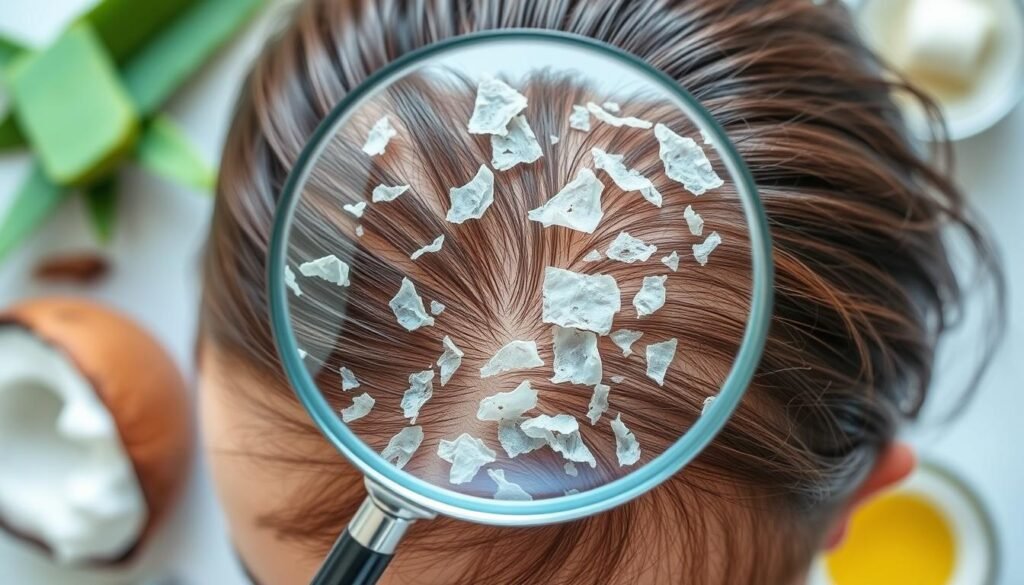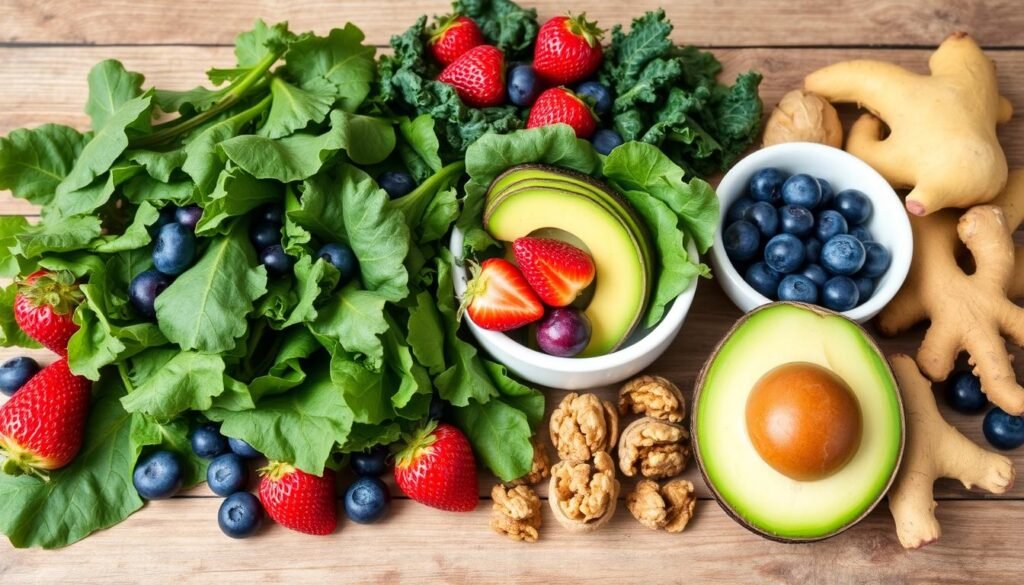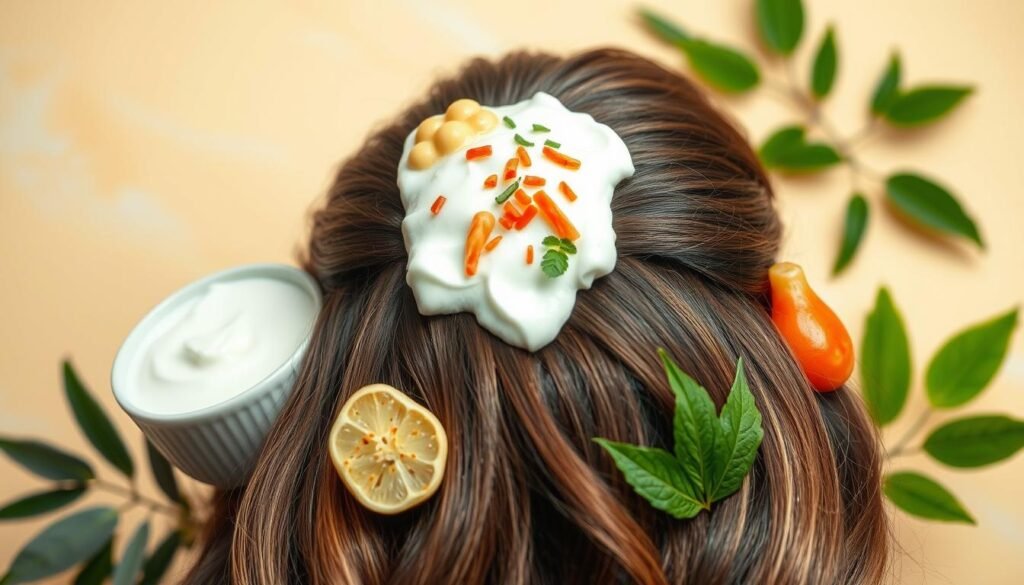Did you know that half the world’s population will face dandruff at some point? This issue, although common, can cause embarrassment. It often comes from various factors, including what we eat. The standard American diet, low in fiber but rich in sugar and processed items, can spike insulin levels. This may worsen scalp conditions. Yet, adding certain natural foods to your diet could be a game-changer. In this guide, we’ll look into foods that help prevent dandruff. We’ll also discuss how vital nutrients keep your scalp flake-free. Plus, we’ll see how natural remedies can ensure your scalp stays healthy.
Key Takeaways
- Nearly 50% of individuals will face dandruff at some point in their lives.
- Dietary choices play a significant role in managing scalp health and dandruff.
- Incorporating natural foods rich in omega-3 fatty acids can aid in reducing inflammation.
- Foods high in zinc and biotin are beneficial for improving dandruff symptoms.
- Limit refined carbs, processed foods, and sugars for better scalp health.
- Coconut oil has shown significant improvements in scalp health in clinical studies.
- Staying hydrated with water-rich fruits and vegetables can support scalp moisture.
The Connection Between Diet and Dandruff
Studies show a clear link between what we eat and dandruff. Eating right plays a big role in fighting this common scalp issue. Dandruff can start from a reaction to oleic acid. This is tied to a yeast called Malassezia on the scalp. Yet, cutting out yeast from your diet isn’t proven to help much.
Eating too much sugar or processed foods can worsen scalp flaking and irritation. A healthy diet helps keep your scalp in good shape. If you don’t get enough of certain nutrients, your hair quality might suffer.
It’s important to include healthy fats in your diet, like omega-3 fatty acids. You can find these in fatty fish, avocados, and nuts. Eating enough protein from eggs, fish, and dairy is also key. This helps make your hair strong. And zinc, from legumes and grains, is good for your hair and scalp.
A balanced diet is key. Eating foods rich in B vitamins, such as biotin, supports skin and hair. Spinach, almonds, and fish are great choices. Keeping your skin and scalp moisturized helps prevent dandruff. So, a diet full of nutrients is great for your hair and skin’s health.
| Nutrient | Sources | Benefits |
|---|---|---|
| Omega-3 Fatty Acids | Fatty fish, avocados, nuts | Helps maintain skin moisture; |
| Protein | Eggs, fish, chicken | Essential for hair strength; |
| Zinc | Legumes, whole grains | Supports a healthy scalp; |
| B Vitamins | Eggs, spinach, fish | Contributes to skin maintenance; |
By choosing what to eat carefully, you can have a healthier scalp and might see less dandruff. Knowing how diet affects dandruff gives you power. It lets you improve your scalp health through what you eat.
Understanding Dandruff: Causes and Symptoms
Nearly half of all adults worldwide deal with dandruff. It’s a widespread issue. Common dandruff causes include dry skin, seborrheic dermatitis, and reactions to hair products. Another cause is the Malassezia yeast, which loves oily scalps. Men often suffer from it more due to their oilier skin. Those with conditions like Parkinson’s disease or HIV also face a higher risk.
The main dandruff symptoms are itching, irritation, and noticeable flakes. Some may find their dandruff oily because of too much oil production. Others might have a dry scalp due to the environment or products they use. Knowing the difference helps in finding the right treatment. Over-the-counter dandruff shampoos, with ingredients like ketoconazole and zinc pyrithione, can help.
When treating dandruff with shampoo, being consistent is crucial. Try it for 2-3 weeks and see if there’s an improvement. Home remedies like apple cider vinegar can also be effective. Spending time outdoors helps reduce oil and flaking on the scalp. It’s important to understand both dandruff symptoms and dandruff causes for proper treatment.

Foods That Help Prevent Dandruff
A balanced diet plays a huge role in keeping your scalp healthy and dandruff-free. Eating foods packed with essential nutrients, like omega-3 fatty acids and zinc, helps keep your skin hydrated. This reduces inflammation too.
Importance of Omega-3 Fatty Acids
Omega-3 fatty acids are key for healthy skin and a moist scalp. They help control oil production, a big factor in avoiding an oily scalp that leads to dandruff. Also, the anti-inflammatory effects of omega-3 rich foods soothe the scalp and lessen irritation. Adding foods like salmon, flaxseeds, and walnuts to your diet is great for their omega-3 benefits.
Incorporating Zinc-Rich Foods
Zinc is vital for a healthy scalp. It’s great for skin repair and combating dandruff. Eating foods high in zinc boosts scalp health and helps prevent dandruff. Foods like oysters, pumpkin seeds, and whole grains are excellent zinc sources. Regularly eating these zinc-packed foods is good for scalp and overall skin health.
| Food Item | Nutrient | Benefit |
|---|---|---|
| Salmon | Omega-3 fatty acids | Reduces inflammation, promotes scalp hydration |
| Flaxseeds | Omega-3 fatty acids | Supports skin health, prevents dryness |
| Walnuts | Omega-3 fatty acids | Helps regulate oil production, reduces irritation |
| Oysters | Zinc | Supports skin repair, reduces dandruff severity |
| Pumpkin Seeds | Zinc | Enhances overall skin function |
| Whole Grains | Zinc | Aids in scalp health, beneficial for hair strength |
Adding these foods to your daily diet can really improve scalp health. This leads to healthier, flake-free hair.
Anti-Inflammatory Foods to Include
Eating foods that fight inflammation can help with scalp issues and dandruff. Focus on fruits and veggies to lower inflammation and boost skin health. These choices deliver key nutrients and keep your scalp balanced.
Fruits and Vegetables that Combat Inflammation
Some fruits and vegetables are packed with antioxidants, which are key to fighting inflammation. For example:
- Berries have lots of vitamins and antioxidants that are good for your skin.
- Leafy greens, like spinach and kale, are full of nutrients that help your immune system.
- Carrots have a lot of beta-carotene, which is great for the scalp.
Adding these fruits and vegetables to your meals can make your scalp healthier and lower dandruff risks. To learn more about food and dandruff, see this helpful guide on how diet impacts dandruff.
Health Benefits of Nuts and Seeds
Nuts and seeds are really good for you and should be eaten daily. They offer healthy fats and nutrients that are good for the scalp. Try these:
- Almonds have a lot of vitamin E which keeps skin moist and can help with flaking.
- Chia seeds are full of omega-3 fatty acids, which fight inflammation and help with dry skin.
Including these health benefits of nuts in your diet supports your immune system and helps manage dandruff. Eating anti-inflammatory foods is fundamental for healthy scalp and better overall health.

The Role of Probiotics in Scalp Health
Probiotics are good bacteria that improve immune function. They help fight fungal infections that cause dandruff. Studies show adding probiotics to your diet helps reduce dandruff symptoms. Foods like yogurt, sauerkraut, and kefir are rich in probiotics. They help balance your gut and improve skin health.

Our bodies have trillions of cells and microbes, including bacteria. This bacteria affects our health, including our scalp. Fermented foods have been eaten for thousands of years. They introduce helpful bacteria that keep us healthy and preserve food. For example, yogurt uses Lactobacillus to help with digestion and protect us from bacteria like Salmonella.
Probiotics boost hormonal activity and vitamin production. They can improve conditions like IBS and inflammatory bowel disease. Eating a balanced diet and making healthy choices supports your microbiome. This can relieve bloating and constipation.
Strains like Lactobacillus Paracasei help reduce dandruff symptoms. They aid in skin recovery and immune response. Eating foods rich in probiotics, such as kimchi, kombucha, and miso, keeps your scalp healthy. Probiotics can also increase hair thickness and improve scalp health. This offers a natural way to better hair and skin.
Eating right can boost your skin and dental health. Focusing on probiotics can fight dandruff and enhance scalp health. For more, check out studies on probiotics and skin conditions at this resource.
Hydrating Foods That Support Scalp Moisture
Keeping your scalp hydrated is key. A hydrated scalp prevents dryness and flaking. This improves your hair’s health. Adding foods that hydrate into your diet boosts moisture. It also brings in vitamins and minerals for skin health.
Water-Rich Fruits and Vegetables
Eating fruits and vegetables full of water is smart. Here are some great choices:
- Cucumbers: They’re about 95% water, making them super hydrating.
- Oranges: Rich in vitamin C, they aid in collagen production, enhancing skin health.
- Strawberries: They’re not only hydrating but also packed with antioxidants for vibrant scalp health.
- Watermelon: A yummy choice, containing about 92% water for great hydration.
- Celery: This veggie hydrates and supplies nutrients for your skin’s upkeep.
It’s important to balance these hydrating foods with plenty of water. Aim to drink half your body weight in ounces each day. For example, if you weigh 150 pounds, try to drink 75 ounces of water daily.
Staying well-hydrated fights dandruff and boosts hair health. For more tips on keeping your scalp in top shape, see how to maintain effective scalp hygiene.
| Hydrating Foods | Water Content (%) | Key Nutrients |
|---|---|---|
| Cucumbers | 95 | Vitamin K, Potassium |
| Oranges | 86 | Vitamin C, Fiber |
| Strawberries | 91 | Vitamin C, Antioxidants |
| Watermelon | 92 | Vitamins A, C |
| Celery | 95 | Vitamin K, Folate |
Vitamin B-Rich Foods for Healthy Skin
Healthy skin is key, and foods rich in vitamin B are vital. They tackle skin troubles, making your skincare routine more balanced. Biotin is especially great. It boosts skin health and keeps it hydrated.
Sources of Biotin and Their Benefits
Biotin is crucial for skin vitality and overall health. It guards cells and keeps skin moist. Eating eggs, spinach, nuts, and avocados gives you biotin. This vitamin B-rich food not only makes skin flexible but also helps to keep it hydrated. This is key to avoid dry and flaky skin.
Lacking biotin can lead to acne, rashes, and dry skin. Getting enough vitamin B, especially biotin, helps lessen these issues. A balanced diet with lots of biotin-rich foods is good for your skin and scalp. Eating these foods regularly prevents deficiencies and boosts your skin’s glow.
Conclusion
Dealing with dandruff means looking at what you eat. Adding certain natural foods to your diet can help a lot. Foods high in omega-3 fatty acids, zinc, and anti-inflammatory properties are key. They improve your scalp’s health from within.
Drinking plenty of water and taking probiotics also help protect your scalp. Together, these steps can make a big difference in fighting dandruff.
Eating right plays a big role in keeping dandruff at bay. Important vitamins like Vitamin B and antioxidants are your allies. These nutrients not only fight dandruff but also boost your overall health and energy.
Fighting dandruff effectively also means choosing the right care routines. By sticking to good nutritional habits and picking the best scalp products, you can get smoother, healthier hair. This can also increase your confidence significantly.